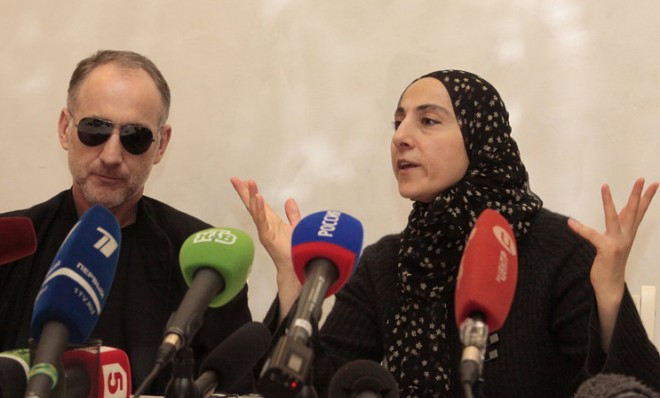Boston bombings: Is Misha a red herring?
The New York Review of Books says it has found the mysterious Misha. Mikhail Allakhverdov says he's no Svengali


When Dzhokhar and Tamerlan Tsarnaev's family members started mentioning a mysterious man named Misha, and suggested he was a driving force behind Tamerlan's descent into radical, violent Islam, it didn't seem like it should be too hard to find the man: How many balding, red-bearded Armenian Muslim converts live in the Boston area?
Then days passed with no news but lots of speculation. Many Armenians protested that no such figure could exist, since the stalwartly Christian nation's bloody history with its Muslim neighbors would prevent any Armenian from converting to Islam. Here at TheWeek.com, Walter Katz suggested that Misha might be an FBI informant who started grooming Tamerlan for a federal sting operation before giving up (prematurely).
On Saturday, anonymous law enforcement sources released a dribble of news: The FBI had identified Misha, they told The Associated Press, but found he had no ties to terrorism generally or the Boston bombings specifically. On Sunday evening, Christian Caryl at the New York Review of Books introduced the world to the man he says is Misha:
The Week
Escape your echo chamber. Get the facts behind the news, plus analysis from multiple perspectives.

Sign up for The Week's Free Newsletters
From our morning news briefing to a weekly Good News Newsletter, get the best of The Week delivered directly to your inbox.
From our morning news briefing to a weekly Good News Newsletter, get the best of The Week delivered directly to your inbox.
Today I was able to meet "Misha," whose real name is Mikhail Allakhverdov. Having been referred by a family in Boston that was close to the Tsarnaevs, I found Allakverdov at his home in Rhode Island, in a lower middle class neighborhood, where he lives in a modest, tidy apartment with his elderly parents. He confirmed he was a convert to Islam and that he had known Tamerlan Tsarnaev, but he flatly denied any part in the bombings. "I wasn't his teacher. If I had been his teacher, I would have made sure he never did anything like this," Allakhverdov said.
A 39-year-old man of Armenian-Ukrainian descent, Allakhverdov is of medium height and has a thin, reddish-blond beard.... Allakhverdov said he had known Tamerlan in Boston, where he lived until about three years ago, and has not had any contact with him since. He declined to describe the nature of his acquaintance with Tamerlan or the Tsarnaev family, but said he had never met the family members who are now accusing him of radicalizing Tamerlan. He also confirmed he had been interviewed by the FBI and that he has cooperated with the investigation. [New York Review]
That seems pretty cut-and-dry — Allakhverdov wouldn't be the first person wrongly accused of involvement in this case. But also on Sunday, the AP's David Caruso, Michael Kunzelman, and Max Seddon published their report on the recent radicalization of another character in this drama: The suspected bombers' mother, Zubeidat Tsarnaeva. And Tsarnaeva says she became religious thanks to the influence of, yes, Misha:
In photos of her as a younger woman, Zubeidat Tsarnaeva wears a low-cut blouse and has her hair teased like a 1980s rock star. After she arrived in the U.S. from Russia in 2002, she went to beauty school and did facials at a suburban day spa. But in recent years, people noticed a change. She began wearing a hijab and cited conspiracy theories about 9/11 being a plot against Muslims....
Zubeidat said she and Tamerlan began to turn more deeply into their Muslim faith about five years ago after being influenced by a family friend, named "Misha." The man, whose full name she didn't reveal, impressed her with a religious devotion that was far greater than her own, even though he was an ethnic Armenian who converted to Islam. "I wasn't praying until he prayed in our house, so I just got really ashamed that I am not praying, being a Muslim, being born Muslim. I am not praying. Misha, who converted, was praying," she said. [AP]
Both these accounts can't be true. Caryl, for example, talks to a "close friend of the family in Boston" who says that "Misha was not known to have visited Tamerlan at home" — a point contradicted now by Tamerlan's mom, uncle, and former brother-in-law. Maybe it was always inevitable that the media would find Misha, and it's probably good for Allakhverdov that a Russian-speaking journalist was the first to break the story. But now that his name and state of residence are out there, it's safe to say this isn't the last we've heard about Misha.
A free daily email with the biggest news stories of the day – and the best features from TheWeek.com
Peter has worked as a news and culture writer and editor at The Week since the site's launch in 2008. He covers politics, world affairs, religion and cultural currents. His journalism career began as a copy editor at a financial newswire and has included editorial positions at The New York Times Magazine, Facts on File, and Oregon State University.
-
 Grok in the crosshairs as EU launches deepfake porn probe
Grok in the crosshairs as EU launches deepfake porn probeIN THE SPOTLIGHT The European Union has officially begun investigating Elon Musk’s proprietary AI, as regulators zero in on Grok’s porn problem and its impact continent-wide
-
 ‘But being a “hot” country does not make you a good country’
‘But being a “hot” country does not make you a good country’Instant Opinion Opinion, comment and editorials of the day
-
 Why have homicide rates reportedly plummeted in the last year?
Why have homicide rates reportedly plummeted in the last year?Today’s Big Question There could be more to the story than politics
